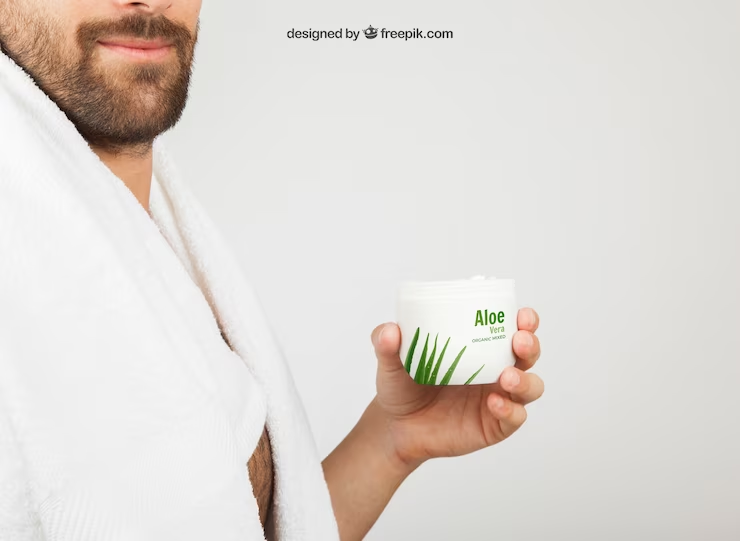
Are you tired of dealing with the painful aftermath of a sunburn? Sunburns can turn a relaxing day in the sun into a discomforting ordeal, leaving your skin red, tender, and hot to the touch. Thankfully, nature has provided us with a remarkable solution: aloe vera.
In this blog post, we will explore the incredible benefits of using aloe for sunburn relief. From its soothing properties to its natural healing abilities, aloe vera is a true champion when it comes to soothing and repairing sun-damaged skin. So, grab a chair, sit back, and discover the wonders of aloe vera for sunburns.
What Causes Sunburn?

Sunburn is caused by overexposure to ultraviolet (UV) radiation from the sun or artificial sources like tanning beds. When your skin is exposed to excessive UV radiation, it can damage the DNA in your skin cells. The body's natural defense mechanism against this damage is to increase blood flow to the affected area, resulting in redness and inflammation.
There are two types of UV radiation that can cause sunburn: UVA and UVB. UVA rays penetrate the deeper layers of the skin and contribute to premature aging and wrinkling, while UVB rays primarily affect the outer layers of the skin and are responsible for sunburn.
Symptoms of Sunburn
Sunburn can cause a range of uncomfortable symptoms that typically appear a few hours after excessive sun exposure and may worsen over the next 24 to 48 hours. Here are some common symptoms of sunburn:
Redness
: The affected skin becomes red and may appear flushed or blotchy. Pain and tenderness: Sunburned skin is often tender to the touch and can be painful, especially when pressure is applied. Heat sensation: The sunburned area feels warm or hot compared to the surrounding skin.Swelling:
In more severe cases, sunburn can cause swelling in the affected area, leading to discomfort and tightness.Itching
: Sunburned skin may feel itchy as it begins to heal, which can be a source of further irritation.Peeling and flaking
: As the sunburn heals, the damaged skin may start to peel or flake off, revealing new skin underneath.Blistering
: In severe cases of sunburn, fluid-filled blisters may develop on the skin. It's essential to avoid popping or picking at these blisters to prevent infection.Fatigue and headache:
Sunburn can sometimes cause systemic symptoms such as fatigue and headache, especially when sun exposure is prolonged.Benefits of Aloe Vera for Sunburn

Aloe vera has gained widespread recognition for its numerous benefits in soothing and healing sunburned skin. Let's explore some of the key advantages of using aloe for sunburn relief.
Soothing and Cooling Effect
Aloe vera gel has a natural cooling effect on the skin, providing immediate relief from the burning sensation caused by sunburn. Its moisturizing properties help hydrate the skin, reducing dryness and itchiness commonly associated with sunburn. Applying aloe vera gel creates a soothing barrier that promotes comfort and alleviates discomfort.
Anti-Inflammatory Properties
One of the primary benefits of aloe vera for sunburn is its potent anti-inflammatory properties. Sunburn often leads to skin inflammation, causing redness, swelling, and pain. Aloe vera contains compounds like salicylic acid and bradykinase that help reduce inflammation, calming the skin and facilitating the healing process.
Skin Repair and Regeneration
Aloe vera is rich in essential nutrients, including vitamins A, C, and E, which play a vital role in skin repair and regeneration. These vitamins help promote the growth of new skin cells, aiding in the healing of sun-damaged skin. Aloe vera also contains polysaccharides that stimulate collagen production, enhancing the skin's elasticity and improving its overall health.
Antioxidant Protection
Sunburn increases the production of harmful free radicals in the skin, which can lead to further damage and premature aging. Aloe vera is packed with antioxidants, such as polyphenols and flavonoids, that neutralize free radicals, protecting the skin from oxidative stress and supporting its natural defense mechanisms.
Minimizes Peeling and Scarring
Sunburn often results in peeling and potential scarring as the damaged skin begins to heal. Aloe vera's moisturizing and nourishing properties help prevent excessive peeling, keeping the skin hydrated and supple. By promoting healthy skin regeneration, aloe vera can minimize the appearance of scars and promote a more even complexion.
How to Use Aloe for Sunburns

Raw from the plant
Using raw aloe vera gel from the plant allows you to experience the plant's natural healing properties in its purest form. The gel is known for its soothing, cooling, and moisturizing effects, helping to alleviate sunburn discomfort and promote the skin's recovery process.
Gel
Gel-type aloe vera products offer a convenient and accessible way to utilize the healing properties of aloe for sunburn relief. These products are formulated with concentrated aloe vera gel, often combined with other soothing ingredients, making them easy to apply and providing additional benefits for sunburned skin.
Lotion
Lotion-type aloe vera products provide a convenient and practical option for using aloe vera for sunburn relief. These products are formulated with aloe vera gel and other nourishing ingredients to create a creamy and easily spreadable texture that offers hydration and soothing properties to sunburned skin.
Consuming raw aloe
While it is true that some people consume raw aloe vera gel straight from the plant for potential health benefits, it is important to note that ingesting aloe vera gel for internal use is different from using it topically for sunburn relief.
Also, aloe vera lotions and gels sold as skin care products are not intended for ingestion. They are formulated specifically for external use and may contain additives, preservatives, or other ingredients that are not suitable for consumption.
How to Apply Aloe Vera for Sunburn Relief

Choose the Right Aloe Vera Product
Opt for pure, organic aloe vera gel or extract fresh gel from an aloe vera plant if available. Ensure the product you choose is free from added dyes, fragrances, or harsh chemicals that may irritate the skin further.
Cleanse the Skin
Gently cleanse the sunburned area with mild soap and cool water to remove any dirt or impurities. Pat the skin dry with a soft towel, being careful not to rub or irritate the sensitive skin.
Apply Aloe Vera Gel
Take a generous amount of aloe vera gel and apply it directly to the sunburned skin. Use clean fingers or a cotton ball to spread the gel evenly over the affected area. Massage it gently into the skin, allowing it to absorb fully.
Repeat the Application
For optimal results, reapply aloe vera gel to the sunburned skin every few hours or as needed. This will help maintain a protective barrier and continuously provide soothing relief to the affected area.
Store Properly
If you're using fresh aloe vera gel extracted from a plant, store the remaining gel in an airtight container in the refrigerator. This will help preserve its freshness and extend its shelf life.
Other Tips for Sunburn Relief
In addition to using aloe for sunburn relief, there are several other tips and remedies that can help alleviate the discomfort and promote healing. Here are some additional tips for sunburn relief:
Cool Compresses
: Apply cool compresses to the sunburned area to help reduce inflammation and soothe the skin. You can use a clean cloth soaked in cool water or add a few drops of lavender or chamomile essential oil to enhance the soothing effect.Hydration
: Drink plenty of water to stay hydrated, as sunburn can dehydrate your body. Proper hydration helps replenish lost fluids and promotes skin healing from within.Moisturize
: Apply a gentle, fragrance-free moisturizer to the sunburned skin to help lock in moisture and prevent dryness. Look for moisturizers containing ingredients like aloe vera, shea butter, or hyaluronic acid.Avoid Irritants:
Refrain from using harsh soaps, scrubs, or exfoliants on sunburned skin as they can further irritate the area. Opt for gentle, non-irritating cleansers and avoid products with alcohol or fragrance.Over-the-Counter Pain Relief:
Nonsteroidal anti-inflammatory drugs (NSAIDs) like ibuprofen can help reduce pain, inflammation, and swelling associated with sunburn. Follow the instructions on the packaging and consult a healthcare professional if needed.Cool Baths
: Take cool baths or showers to help soothe the sunburned skin. Avoid using hot water, as it can further irritate the skin.Loose Clothing
: Wear loose, breathable clothing made of lightweight fabrics to avoid further irritation and allow the skin to breathe. Avoid tight or synthetic materials that can trap heat and exacerbate discomfort.Sun Protection
: Protect your sunburned skin from further sun exposure by wearing protective clothing, such as hats and long sleeves, and applying a broad-spectrum sunscreen with a high SPF.Avoid Peeling or Picking
: Resist the urge to peel or pick at any peeling skin, as it can slow down the healing process and increase the risk of infection. Allow the skin to naturally shed as it heals.Seek Medical Attention if Necessary:
If you experience severe sunburn with blistering, intense pain, dizziness, or signs of infection, it's important to seek medical attention promptly.Is it safe to use aloe vera on sunburned skin?
Using aloe vera for sunburn is generally considered safe and not likely to cause any harmful side effects, according to the National Institute of Environmental Health Sciences.
When aloe vera is ingested, it can have a laxative effect on the body. Consuming aloe vera in large amounts or on a regular basis can potentially result in abdominal cramps, diarrhea, and worsening symptoms of constipation. The laxative properties of aloe vera can lead to electrolyte imbalances, particularly if used excessively or in individuals with underlying digestive conditions.
Are there potential risks from using aloe vera on sunburns?
While aloe vera is generally considered safe for most people when used topically, there is a small chance of experiencing an allergic reaction. Some individuals may be allergic or sensitive to aloe vera gel, which can result in skin irritation, redness, itching, or a rash. If you have a known allergy to plants in the Liliaceae family (such as onions, garlic, or tulips), you may be more prone to developing an allergic reaction to aloe vera.
Bottom Line
Aloe vera's cooling properties, moisturizing effects, and potential anti-inflammatory benefits make it a popular choice for sunburn relief. Whether using the raw gel from the plant, commercially available gel or lotion, or opting for aloe vera-based products, it is important to choose high-quality, pure formulations.
While aloe vera provides soothing and healing benefits, it is crucial to remember sunburn prevention through sun protection measures. When used appropriately, aloe vera can help ease the discomfort of sunburn and promote the healing process, providing much-needed relief for your skin.




